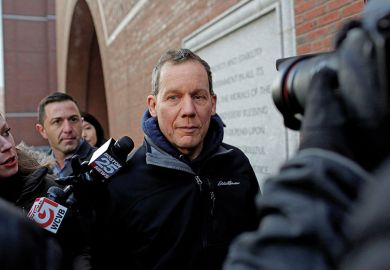The past year has seen US prosecutors subject the country’s universities to closer scrutiny than ever before – with wealthy parents facing prosecution for allegedly paying bribes to secure college places for their children and leading scientists threatened with jail for supposedly failing to disclose research funding ties with China.
Leading the charge on both fronts has been one lawyer: Andrew Lelling, the US attorney for Massachusetts. Speaking to Times Higher Education, Mr Lelling acknowledged that the arrest of Harvard University chemistry star Charles Lieber made clear that government tolerance of Chinese research partnerships had shifted swiftly.
Mr Lelling, the prosecutor behind Professor Lieber’s arrest, said that the lone charge he faces – lying to investigators – could never be tolerated. At the same time, he conceded in an interview, academics may be legitimately feeling some “mixed signals” about what ultimately is being prohibited in their world.
As for the prosecution of the nationwide college admissions scandal, which Mr Lelling is leading, there he sees academic institutions as the side potentially being less than clear about what it really hopes to prohibit.
In charging parents with bribery for using falsified sports credentials and other ruses to win university entry for their children, Mr Lelling said it was only because the law forbids such behaviour that he could get involved.
That leaves US universities to weigh banning similar shortcuts for the children of their wealthy donors, he continued. “The schools themselves need to decide whether they’re OK with that.”
In both sets of cases, Mr Lelling, a career prosecutor who has served through Republican and Democratic administrations, emphasised that his role was to focus on the boundaries established by the law, rather than to worry over any policy ambiguities or inconsistencies that might be troubling the affected parties.
The case of Professor Lieber has been especially alarming to universities. The Obama administration had welcomed US-China research teamwork in non-classified arenas, and Professor Lieber – one of the world’s best-known chemists – took up the call, forming a partnership with China’s Wuhan University of Technology.
But the Trump administration has pursued a substantially different tack, stoking fear about foreigners and putting particular emphasis on Chinese spies seeking technological secrets with economic and military value.
Mr Lelling acknowledged that the administration had imposed on academics “a significant change” in official attitudes towards China, and had used law enforcement as its initial tool for gaining compliance.
“You are watching policy evolve in real time,” he said. “Meaning, the first step you’ve seen is from the enforcement side.”
At the same time, government officials perhaps have not clearly communicated their policy, and may even have not yet decided one, regarding whether they “want this underlying collaboration to occur in the first place”, he said of US-China research ties. “Right now, the position of federal government is, ‘Yes, we do,’ but I think I understand how the public would see this as mixed signals.”
That ambiguity, however, does not apply in Professor Lieber’s case, Mr Lelling said. It is true that there is no suggestion that the chemist was a spy or was involved in any classified research, the prosecutor said. But when he was questioned about his work, Professor Lieber is alleged to have told federal investigators something untrue, and that, Mr Lelling said, cannot be ignored when the government is investigating matters as serious as espionage.
In the college admissions case, Mr Lelling attracted a measure of disdain when, in initially announcing the charges last March, he condemned the alleged acts of parental bribery by declaring: “We’re not talking about donating a building so that a school is more likely to take your son or daughter.”
In the interview in his downtown Boston office, Mr Lelling stressed the legal distinction he was making while accepting some moral parallels in short-cutting merit-based admissions processes through either bribes or donations. “I’m not saying either is a good thing,” he said.
Some of the nation’s most elite universities have stuck with wealth-based admissions preferences despite the negative attention generated by the bribery scandal, Mr Lelling said. Yet the scandal has clearly motivated many institutions to work harder at rooting out any illegal methods, he said.
Mr Lelling said the legal counsels of many universities have asked him for tips on fighting admissions-related bribery. He said he could not help to identify what loopholes might be found now that sports-related options appear closed, although he expressed certainty that fraudsters were seeking them.
“The pressure is just too great for students or parents to not find the next clever way to get their kid into school,” he said.
While Massachusetts is home to many of the country’s top colleges and universities, it is only with the emergence of the two current high-profile cases that Mr Lelling, a native of New York City and graduate of the University of Pennsylvania’s law school, is becoming well known in academia. “People seem to think we have some kind of sideline now on higher ed,” he said. “And it’s just a coincidence.”
POSTSCRIPT:
Print headline: Prosecutor’s eye is on law – and those who break it
Register to continue
Why register?
- Registration is free and only takes a moment
- Once registered, you can read 3 articles a month
- Sign up for our newsletter
Subscribe
Or subscribe for unlimited access to:
- Unlimited access to news, views, insights & reviews
- Digital editions
- Digital access to THE’s university and college rankings analysis
Already registered or a current subscriber?








